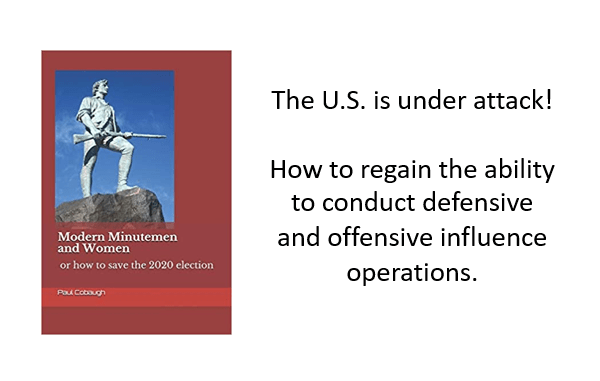
Paul Cobaugh’s book Modern Minutemen and Women provides a detailed look at the U.S. governments’ inability to conduct influence operations to counter the propaganda efforts of Russia, China, and other adversaries. His book outlines the deficiencies with the various organizations of the U.S. government – to include the State Department, Department of Defense, and other agencies. He also provides several important recommendations to improve our defensive and offensive capabilities when it comes to information operations or narrative warfare.
Using examples from the Cold War, the post-Cold War period, Iraq, Afghanistan, and elsewhere Paul describes the failures of the U.S. information operations (IO) activities. He surveys the government’s information operations organizational structure (to include the military) and explains how this IO failure has taken place. His recommendations for the centralization of narrative warfare makes sense – many others have made similar recommendations.
The U.S. government failed in its attempts to halt Russian interference in the 2016 presidential elections. The Russians were at it again during the 2018 mid-term elections . . . and are now currently interfering in the 2020 presidential elections. But it isn’t just the Russians this time. China, Iran, and others are seeking to create diversion and confusion in the 2020 elections as well.
In his book he urges the political parties to put partisanship aside and join together as one nation to defend against the nefarious activities of Russia, China, and others. He provides a guide for government leaders and policy makers to put our narrative warfare capabilities (offense and defense) back on track.
The author believes that under the current political environment the various U.S. government agencies – and the respective political parties – are unable to effectively counter influence activities by our adversaries. So he calls on individual Americans to respond to this crisis – as the Minutemen did in the early days of this nation. There is an entire chapter of the book for the individual American that provides basic steps to sorting through real news and fake news. In his book he includes a complete annex of free election security tools and resources for government, business, and citizens.
The U.S. intelligence community has proven without a doubt that America is under attack domestically by our adversaries. In addition, after two decades of conflict, we have demonstrated an inability to provide an effective narrative to complement our counterterrorism and counterinsurgency campaigns overseas. Our federal government has only selectively addressed this threat to our domestic security and our lack of influence capability in overseas conflicts. This failure ranges from the lack of effort to defend our elections from attack to a structural and organizational inability to conduct influence operations around the world.
This book is primarily focused on Russian narrative warfare targeting the U.S. domestically as well as U.S. activities and interests overseas. However, the author sees the U.S. under continuous attack by China, Iran, and others as well. These adversaries will continue to conduct these influence activities until we address this critical gap in our national defense.
The book is a good read for those seeking to understand narrative warfare, how our elections are compromised by foreign interference, and how we can regain the initiative in offensive and defensive information operations in an era of great power competition in the future years ahead.
**********
Modern Minutemen and Women: or how to save the 2020 election, by Paul Cobaugh, 2020, 263 pages.
https://www.amazon.com/Modern-Day-Minutemen-Women-election-ebook/dp/B08BDZQCTJ
Paul Cobaugh retired in 2015 from the U.S. Army after a career in the U.S. Special Operations counterterrorism community. While with the Army he specialized in influence operations. His primary focus was on mitigating adversarial influence and advancing US objectives by way of influence. He is currently Vice President at Narrative Strategies.